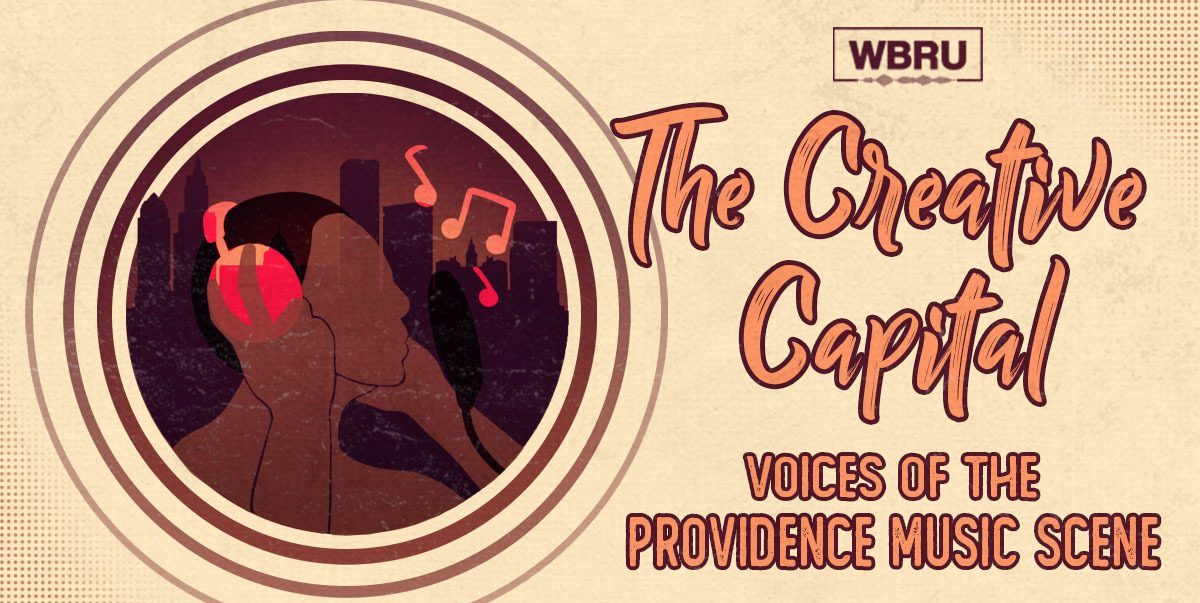“The Creative Capital:” Voices from the Providence Music Scene
As WBRU features Black artists from around the country in the summer Revolutionary Roots series, WBRU360 heard from seven local artists who shared their experiences and views on the past, present, and future of Providence music.
Providence, RI, capital of the tiniest state in the U.S., makes up for its small size with an overflowing personality and a fertile arts community. Many of its residents are quick to remind you that this city is the self-proclaimed “Creative Capital” of the country, and the nickname is hard to deny. Artists of all kinds, and especially talented BIPOC (Black, indigenous, and people of color) musicians, have long made Providence a city to know.
In the mid-twentieth century, Providence boasted New England’s first ever interracial jazz club, the Celebrity Club. Musical legends such as Nat King Cole, Louis Armstrong, and Billie Holiday stopped in Rhode Island to perform for audiences of all races at the Club on Randall Street in Randall Square, a historically vibrant Black neighborhood. Local historian Tom Shaker, who made a documentary about the Celebrity Club, explains how these jazz musicians “would come here and stay for a week, and a lot of the kids growing up that are older musicians now would go to hear them play. And they would sometimes play opening acts or intermissions at the Celebrity Club, so they learned to play from a lot of these musicians that would come through Providence, and they got to develop relationships.” The integration of the club brought attention and talent to Providence, and “it really helped break down some barriers,” says Shaker.
Unfortunately, the Celebrity Club closed down in the early ‘60s after it was repeatedly targeted by police raids and was sold by its owner. During the Club’s run and ever since, the Providence music scene has continued to be a rich source of talent that’s deeply intertwined with the local community. Over the past several decades, local hip-hop and R&B musicians — often connected through family, friendships, and neighborhoods — have come up together and built a strong artistic network in the city.
Although these artists by no means make up the entirety of the large, multifaceted Providence music scene, they play an important role in building Rhode Island arts and strengthening the PVD spirit. WBRU360 heard from seven of these local artists, DJs and creatives as they shared their experiences and views on the past, present, and future of Providence music.
Hip hop in Providence’s past
DJ Franchise is a prolific Providence DJ who has spun at WBRU360 for six years along with producing his podcast The Franchise Report, which is followed by thousands. He remembers how the scene “kind of focused on mainly hip-hop for a while. In the mid-90s to early 2000s, at the Dunkin’ Donuts center, every year there used to be a hip-hop concert that would get like 10,000 people.” And then, he says, “as time progressed, we started getting a lot of R&B singers too. But it’s mostly been a huge, huge hip-hop scene, and still today it is.”
Another hotspot for hip-hop music from 1996 to 2009 was the Providence Black Repertory Company, known as the Black Rep, on Westminster Street. “So, the Black Rep was the hub for Black art and Black expression, and they had an open mic on Monday nights. And that’s when I would really hone my skills in front of an audience,” says rapper Jon Hope. Hope has been an integral part of the Providence music scene since he came up fifteen years ago, and he’s since built a national reputation, appearing on BET and MTV along with becoming a college professor at Rhode Island College and starting his own multimedia company, Zayn Butler. He recalls how the Black Repertory Company became much more than just a performance space for local artists. “The Black Rep was really instrumental,” he says, “not only individually, but also in building a sense of community around Black art.” Hope explained that the club provided a unique space at the time “because there was this undertone in the city, a racial undertone, and a sort of elitism. The places and the promoters that would have events and what-have-you, it was usually white promoters and white artists that would perform under the guise of quote-unquote ‘real hip-hop.’”
Hope, and others at the Black Rep, weren’t interested in the “lyrical miracle type thing” that white artists were calling “real hip-hop.” He says, “where I come from, the Black hip-hop artists, we were talking about the things that were happening in our city. And the Black Rep… ran the gamut in terms of how people wanted to express themselves.”
In 2015, continuing the tradition of Providence’s flourishing creative spaces, the music and arts festival PVDFest began its annual celebration of local art and expression. Since its inception, the festival has brought over 100,000 attendees to downtown Providence. Event photographer Stanley Bois (known all around the city as Hot in RI), who is also a guest on the WBRU360 Morning Show, says that “PVDFest… opens artists up to being seen by people who they normally wouldn’t be seen by. It’s a stomping ground for artists to just build their network and their art.”
The Fest has boosted additional music events like Day Trill, a daytime rave started in 2012 by stay silent PVD, an event, marketing, and creative agency. “Day Trill was held at PVDFest and it was huge there, and then it just grew into a monster,” Bois remembers. “Now it brings out thousands of people.”
A unique PVD culture
There’s a reason why these events can thrive and attract such huge crowds on the fuel of local music: Many locals agree that Providence has a heaping share of talent in every creative arena. Chachi Carvalho, a second-generation Cape Verdean rapper born and raised in Pawtucket, says that “there’s always been a surplus of talent, always. I think Providence is just abundantly talented across all genres, all mediums of art.”
Carvalho is a legendary PVD rapper who’s been rapping since he was eleven, and he owns his own studio along with educating and mentoring young people in RI. He’s headlined PVDFest for multiple years, won the Wild Out Wednesdays competition on the BET show 106 & Park, and now serves on the board of various Providence arts organizations. Being in the game for so long, he’s seen a lot of Providence talent, and he has a theory about why the PVD scene is thriving: “Maybe it’s because we are so diverse in terms of culture, and historically over the past few decades people have come from all over the globe and made our little corner home.”
In addition to the influence of various cultures, the small size of Rhode Island also contributes to making the Providence scene unique by stoking competition between artists. “There’s a certain level of hunger that local artists have because we’re small,” says Carvalho. “You kinda know who everybody is who’s doing it, and there’s a competitive edge to it, being in an area that has limited resources and opportunities. I think that instills in all of the artists this sense of hungering… that makes for really dope art.”
Twenty-year-old singer-songwriter Storm Ford agrees. She’s been involved in the music scene for years, from performing at PVDFest to getting a song featured as the #1 spot and cover on a UnitedMasters Select Spotify playlist (UnitedMasters is a distributor and agency for independent artists). “I think there’s no other place like Providence,” Ford says. “That’s because we’re the creative capital. But I feel like Providence has also tried really hard to keep that energy alive. And it’s something that could have dwindled if it wasn’t maintained. I think we just have a lot of leaders in the community.”
But beyond talented individual artists hustling and standing out, singer and rapper Nino Francis adds, “I think that we have a really tight-knit community.” Francis has been spitting rhymes since his rap battles during elementary school recess, and he now combines his music career with eye-catching graphic design work for his own projects and for other PVD artists. In the Providence scene, just like in his own career, he values a resourceful and collaborative spirit. “We have a way of thinking outside the box and pushing boundaries for ourselves. And ‘community’ really is the main word I’d use to describe it — it’s like family in a way.”
Ford echoes this appreciation for close personal ties in the music scene. “Everybody’s connected in some way,” she says. “You know a friend of a friend, or you worked with them… and I feel like other cities can’t say that. And the connections are typically very intimate. For the most part, everybody has hung out with everybody.”
The overflow of local musical talent is also promoted by a strong, ongoing radio culture in Providence, helmed by well-known DJ personalities. “DJs out here still hold the key to the city,” says Bois. “You still need DJs to get music on the radio, and people still listen to the radio. Everybody can just be themselves and be successful, because you have different avenues to get your music out here; there’s different DJs that will listen to different kinds of stuff and push it out.”
In the smallest state, space gets cramped
While DJs offer local clout and various opportunities to be heard, artists still often have to compete for audience and resources — and not everyone stays in Providence. “Me personally, I love it when local artists win,” says Carvalho, “but there’s a problem where everybody who becomes successful ends up leaving.” Many musicians have to look to other, larger cities to build their followings. But even leaving Providence can take as much grit and hard work as competing for clout in the city. DJ Just1, a DJ for WBRU360, says, “It’s easier to get known in Rhode Island, but then it’s a little tougher trying to get out. You have to be really creative to get a following outside of Rhode Island.”
Even Carvalho, who’s considered an OG of the Providence scene, had to look to a whole other country to boost his career. “I was only able to kind of reinvent my career and get a boost when I started directing my music towards Cape Verde,” he explains. Traveling to Cape Verde to tour and sell music there helped to get his name out and gain him more acceptance back in the States; he even won for Best Hip-Hop at the Cape Verdean Music Awards in 2014. “I started directing my music and artistry towards there, trying to get some success there, and it worked,” he says. “By doing so, I was able to kind of reignite what I was doing and was able to get more eyes and attention and create more opportunities for myself in Rhode Island.”
Storm Ford feels that these musicians who go elsewhere can ultimately return to strengthen the Providence music scene. “There are just a lot of artists right now that are going out there to network and to build so they can bring it back to Rhode Island, or at least I would hope that’s what their end goal is. I do feel like it is important to expand your network and go, like, plant yourself in other places, but you have to find a way to reciprocate that energy to where you come from.” She pays her dues to Providence by repping her city to people she meets in the industry and by tagging PVD in her Instagram photos. “I want other people to feel what it’s like to be here, you know?”
The Cape Verdean musical community
It’s impossible to talk about the music scene in Providence without bringing up the vibrant and influential Cape Verdean community, which so many legendary local artists come from, including Carvalho and the internationally-praised DJ Lefty. Bois, whose brother Big Joe does a Cape Verdean Afrobeats show on the URI radio station WRIU, says that the “Cape Verdean community… take that sound of Cape Verdean music and integrate it with the hip-hop sound here. A lot of them now do rap, but they do it in Cape Verdean Creole, they do trap music in Cape Verdean Creole. It’s really grown to a worldwide phenomenon.”
DJ Lefty is representative of this worldwide phenomenon. “I’m the very first person in my family to be born in the United States, outside Cape Verde,” he explains. Raised on the East Side of Providence in the Camp Street area, he “grew up listening to hip-hop, R&B and stuff like that, and inside our homes our parents was listening to modern and traditional Cape Verdean songs.”
After learning the basics of mixing from an uncle and teaching himself how to scratch, Lefty built a prolific DJing career. He’s now a renowned DJ in New England, and he spins across various cities in the U.S. and out, even traveling back and forth between the U.S. and Cape Verde to perform at events. In 2013, he won Best DJ at the first annual Cape Verdean Music Awards, and he continues to build his influential career internationally.
The only way to go is up
Even as Providence artists are grateful for the city’s rich creative past, and already have an impact locally and globally, they are looking towards an even stronger future. “The culture out here is growing, the hip-hop culture is growing,” says Bois — “it’s just a matter of time” until Providence gets the full spotlight that it’s due.
Ford is also optimistic about the path of Rhode Island creatives. “Considering current events these days and the issues with racial discrimination, I feel like people are really opening their eyes to things that need to be worked on, and I feel like it makes artists want to be more intentional and responsible with the art that they put out,” says Ford. “And I just see the art scene in Providence becoming a more conscious one and a more thoughtful one, not that they haven’t been that way before, but just on another level, you know? I think that something that we’ve always been really good at is being loud and being proud. I just think it can only get better from here. I feel like we’re leading by example for the youth.”
“I think that over the years it’s only gotten better,” agrees Francis. “I guess it’s only gonna go up, because like I said, we have so many different people doing different things in different places, like a Lily Rayne who’s not even in Rhode Island anymore but she’s on a different level. We have a Storm Ford, who’s also on a different level musically and still representing.”
To those who haven’t yet been lucky enough to hear about the Providence music scene, prepare yourselves. “We have something special bubbling,” says Francis, “and if anybody tells you otherwise, they’re lying.”


